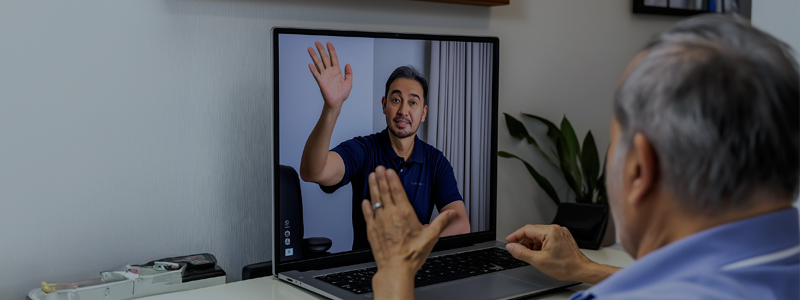Occupational Therapy Telehealth
Let our Expert Online (Telehealth) Occupational Therapists Help You Live A Life With Less Limits. Experienced & Friendly Team. Free Concierge Session. Book TodayBook an appointment or make a referral
The referral and booking process takes less than 5 minutes. We endeavour to respond to all enquiries and referrals the same day they are received and in most cases, we are able to confirm an appointment time with you within 48hrs.
Occupational Therapy Telehealth
Online Occupational Therapy for Adults and Children
Occupational Therapists (OT) work with people to complete the activities that they need and want to do each and every day.
The goal of OT is to get the best fit between you as the person, the activity and the environment that you perform that activity.
Why Choose Online Occupational Therapy?
- Ability to see clients from all ages - from as young as a few months old to many years
- All condition and referral types – there are very few referrals that can’t be seen online
Did you know? Our experienced online clinical team see:
- Adults and children who have difficulty with social skills, from ages 0 years old to 80+ years old
- Fine motor such as difficulty with handwriting
- Minor and major home modifications
- Specialised Equipment prescription
- Home rehabilitation
- Falls prevention
- Structural modification
- Specialised seating/ wheelchair prescription
- Scooter & mobility assessment and training
- Palliative care
- Chronic pain management
- Stroke & neurological rehabilitation
- Support disability accommodation (SDA) assessment
- Supported independent living (SIL) assessment
- Links to community facilities & resource
- Cognitive assessment & retraining
- Access solutions
- Pressure care
- Pressure cushion
- Pressure mattress
- Pressure area care
- Electric bed and chair prescription/review
- Dementia Care & Planning
- Complex & customised equipment
- And much more
Just as effective, if not better, than in-person therapy
Telehealth occupational therapy has been shown to be just as effective as in-person therapy. According to a study published in the Journal of Telemedicine and Telecare, clients receiving telehealth occupational therapy demonstrated comparable, if not superior, outcomes compared to those receiving in-person care
Not sure if your child will stay engaged on-screen?
Sessions are tailor-made and designed to be fun and interactive for our younger children to help achieve outcomes.
Importantly, giving the parent or carer the tools and strategies is a core part of our belief in effective therapy so that you can support your child every other hour of the week. We provide you with the tools to succeed and you are as much a part of the picture.
Access experienced clinicians across Australia
Access a range of experienced clinicians across Australia that you may not otherwise be able to see.
Immediate Access, No Waiting Lists
Don’t wait any longer for the care you need. With Physio Inq, you can enjoy on-time, flexible appointments without the hassle of waiting lists.
Book an appointment or make a referral
The referral and booking process takes less than 5 minutes. We endeavour to respond to all enquiries and referrals the same day they are received and in most cases, we are able to confirm an appointment time with you within 48hrs.
About Physio Inq's Care
- Strong history in telehealth
- Over 20 clinical experts in services for telehealth & online therapy across Australia
- A commitment to expediting referrals based on clinical needs
- Dedicated contact person for your business
- Access to multiple disciplines and services under one roof
- Large geographical coverage
- High quality reporting
- Experienced clinical staff
Today Physio Inq is pushing allied health in a new exciting and accessible direction for all Australians through it's telehealth services.
Why worry about the stresses of parking and traffic when you simply don't have too anymore. Our Allied Health Team are currently serving the following states in Australia;
Liquid error: can't find partial "modules/homepage/_contentholders/ndis_region_by_service". url: www.physioinq.com.au/service/occupational-therapy-telehealth page: service partial stack: modules/_admin/_views/service-telehealth-with-formAlternatively contact us by phone on
1300 731 733

